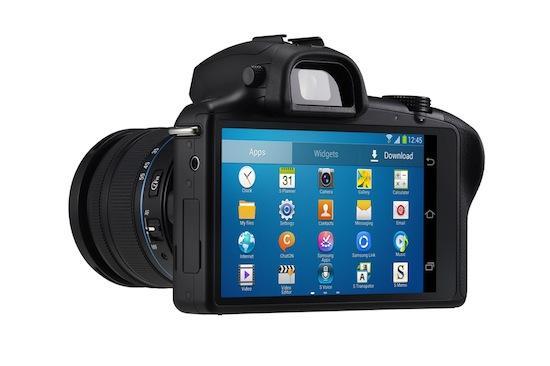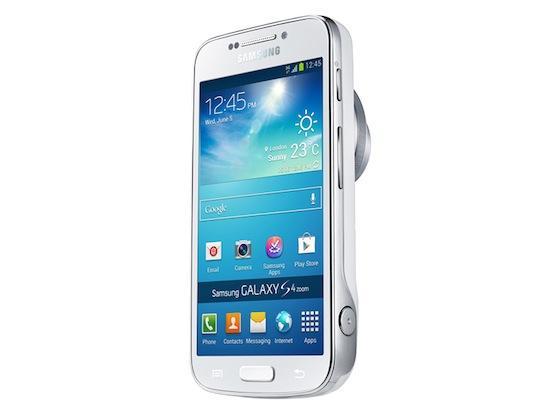
Over the last couple of weeks, Samsung has done what Samsung does best: announce things. While we had already known about plenty of the devices that made their official debut recently, as usual it's always good to finally get the final, official announcement out of the way. With those announcements, devices like the Galaxy S4 Zoom and the Galaxy NX camera are finally really real, and now the only thing we need to keep waiting for is a release date and pricing.
But it shouldn't be too long before Samsung reveals those key details.
Some of Samsung's biggest announcements this month have focused primarily on cameras. Sort of. Some could argue that Samsung's biggest focus has been Android, and continuing their effort in putting the mobile operating system in different devices, and those people wouldn't be wrong. However, Samsung is making a point to do so on cameras with high megapixel counts, and that are obviously aimed at those specific niche markets.
As I said earlier, Samsung has been doing what Samsung does best, and that's releasing new devices that fill every nook and cranny within the tech market. I saw more than a few times on Twitter, after Samsung had unveiled their Galaxy NX camera, people asking, "Why?" Why did Samsung just unveil the Galaxy S4 Zoom a week before unveiling a camera running Android?
That's a good question, considering there's no doubt that the selling point of the Galaxy S4 Zoom is indeed the camera. With specifications more similar to the Galaxy S4 Mini, save for the dedicated camera poking out of its back, I don't see the Galaxy S4 Zoom battling for the top spot on the smartphone hierarchy.
But, the answer is that Samsung's Galaxy S4 Zoom isn't meant to provide the full "camera" experience in the same way that the Galaxy NX is supposed to. One's a phone with a high megapixel count camera on the back. The other is a camera, with Android shoved inside. It's up to you, as my fellow editor Marc Flores outlines, to determine which of the two devices, or either, are worth your hard earned money.
That got me thinking about Samsung's biggest competitor, Apple, and wondering if the company would ever think about doing something like this. Two years ago, I would have said, "No way, not possible," but now that Apple is changing so many different things (but doing a stubborn job of keeping a lot of things the same), the question may not be as impossible as it used to be.

Of course, there'd have to be a reason for Apple to do it. Right now, the company seems content on raking in the money from their iPhone, iPad and iPod lineups, all of which have cameras of their own. And while some would argue that the experience of a smartphone camera pales in comparison to things like the Galaxy NX camera or even the Galaxy S4 Zoom, Apple thinks you'll be happy enough with the camera on your iDevice.
Or you'll just go out and buy a dedicated camera, right? So, wouldn't it make sense for Apple to create something that speaks to those people? The folks who don't want to use their iPhone camera, but would rather have a dedicated piece of hardware to get the job done?
Apple could capitalize on the market that Samsung is trying to get a grip on right now. iOS-based devices, with their plethora of apps --especially many of which are focused on photography-- would be an easy choice for a lot of people if it had the Apple hardware standard, as we've seen on the iPhone 5. A high-end camera like that would surely be desired by anyone looking for a dedicated camera, especially if it had connectivity like WiFi and even LTE built in.
But, a camera like that would surely be ridiculously expensive, too. Then again, many have already speculated that Samsung's Galaxy NX camera will be super expensive, too. We'll just have to wait and see how that particular situation unfolds, before we can make a final judgment call on it.
A device that's essentially an iPhone, with a touchscreen display that measures in around 4.3- or 4.5-inches, attached to a dedicated camera with interchangeable lenses, and access to all apps within the App Store sounds like a dream come true for anyone who's already entrenched in the Apple-branded ecosystem.
Or is it? Is a dedicated camera running iOS something you'd ever consider buying? Or would you imagine the price tag for a device like that would inherently put it out of the reach of quite a few buyers out there? Is the dedicated camera market one that you think Apple would ever try to capitalize on? Or would they be better off going with an accessory, like wearable technology? Let me know what you think!